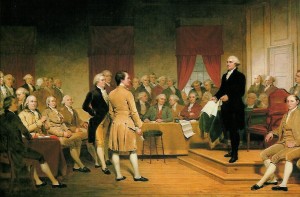Source: Dao, James, Unions Oppose Constitutional Assembly, New York Times, November 1, 1997.
A letter to union members warns that constitutional provisions protecting their “homes, families and jobs” are in “extreme danger.” A labor official walking door-to-door tells people that their union pensions could be jeopardized. A television commercial darkly predicts that taxes will go up.
Tuning the political machinery that has made organized labor a perennial force in New York State elections, the state’s largest unions have pulled out the stops in urging union workers to vote against a measure on next week’s ballot to authorize a convention that would consider changes to the state’s Constitution.
The unions, including the state A.F.L.-C.I.O., are spending millions of dollars on fliers and advertisements and mobilizing thousands of election workers to tell voters that a constitutional convention would be either an expensive waste of time or would allow big business to undermine decades-old union protections based on the State Constitution.
Labor strategists say they hope the state’s more than 2.5 million union workers can tip the scales against the convention if voter turnout is light on Tuesday — which is likely, since besides the convention question, only local offices are up for election in most districts.
But the vehemence of labor’s anti-convention message has stunned convention supporters and others, who contend the unions are aggressively employing the kind of negative sloganeering that has made voters deeply cynical about politics.
“To me, it’s the low road,” said Gene Russianoff, a lawyer with the New York Public Interest Research Group, a nonprofit organization that is staying neutral in the debate. “The progressive opponents of the convention have adopted the most anti-government rhetoric of the right.”
The State Constitution requires that voters be asked every 20 years whether they want to hold a convention to rewrite the constitution, but the Legislature can vote to put the question on the ballot at any time. The last year the question was posed, in 1977, voters turned it down. If the convention is approved, voters would elect delegates in 1998, and the convention would be held in Albany in 1999. Any changes proposed would need to be ratified by voters.
The labor unions are the driving force behind Citizens Against a Constitutional Convention, which also includes civil-rights, environmental, trial-lawyer and abortion-rights organizations. Also fighting the convention, though not in alliance with the coalition, are Change-N.Y., an anti-tax group, and the State Conservative Party, both of which have historically been labor’s antagonists, as well as the majority leaders in both houses of the Legislature.
Supporters of the convention include Gov. George E. Pataki, former Gov. Mario M. Cuomo, and B. Thomas Golisano, a Rochester businessman and 1994 gubernatorial candidate. Mr. Golisano has contributed $300,000 to promote the convention.
Different unions express different concerns about a convention. The Civil Service Employees Association, the state’s largest public employees union, contends that anti-tax forces might push to make it harder for governments to impose taxes, which could lead to layoffs of government workers.
The New York State United Teachers, which represents 200,000 teachers, argues that a convention might try to repeal constitutional restrictions on spending tax dollars for private schools, which could reduce aid to public schools. (A similar proposal was approved by a constitutional convention in 1967, but was rejected by voters.) And a variety of unions say that anti-labor groups would try to use a convention to undermine constitutional provisions safeguarding union pensions and the right to organize.
“A convention could take away every right you have,” says a flier from the union of civil service employees.
Striking a populist stance, the unions are also hammering home the idea that a convention will waste tax dollars because it will be run by lobbyists, elected officials and affluent special interest groups — the people who dominate Albany now. Of course, convention supporters consider unions to be another of the state’s most powerful interest groups.
“The same old insiders want to throw a party for themselves in Albany,” says the narrator in a television commercial running in New York City and several upstate cities. “It will cost taxpayers $50 million. And they say taxes won’t go up? Sure.” The spot concludes: “Imagine how many textbooks and computers $50 million would buy for our children.”
Citizens Against a Constitutional Convention is spending $725,000 on the 30-second spots, with at least $400,000 of that money coming from unions. Print ads are running in newspapers and union newsletters.
In addition, the teachers union is running 14 phone banks around the state that are making 1000 calls a night urging people to vote no. And the A.F.L.-C.I.O. expects to have 3,500 canvassers going door-to-door between now and Election Day urging people to oppose the convention.
Convention advocates say the unions’ concerns about a constitutional assault on labor rights are hyperbolic. “I’m stunned by their attacks,” said Robert L. Schulz, chairman of the We the People Congress, a grass-roots group pushing for the convention. “In all of the meetings we’ve held for two years, those issues never came up.”
Mr. Schulz and other convention supporters think the unions are secretly working with legislative leaders, who oppose the convention partly because they think it could result in term limits for themselves. Labor officials deny any such cooperation.
But union organizers acknowledge having a more pragmatic purpose than their commercials suggest: blocking the convention now would be less costly and time-consuming than running delegates or lobbying convention leaders later, they say.
“We would have to be involved if there was a convention,” said Suzy Spilker Ballantyne, director of political education for the state A.F.L.-C.I.O. “But just look at the cost of running delegates. Is a regular working guy going to be able to afford it? I don’t think so.”
